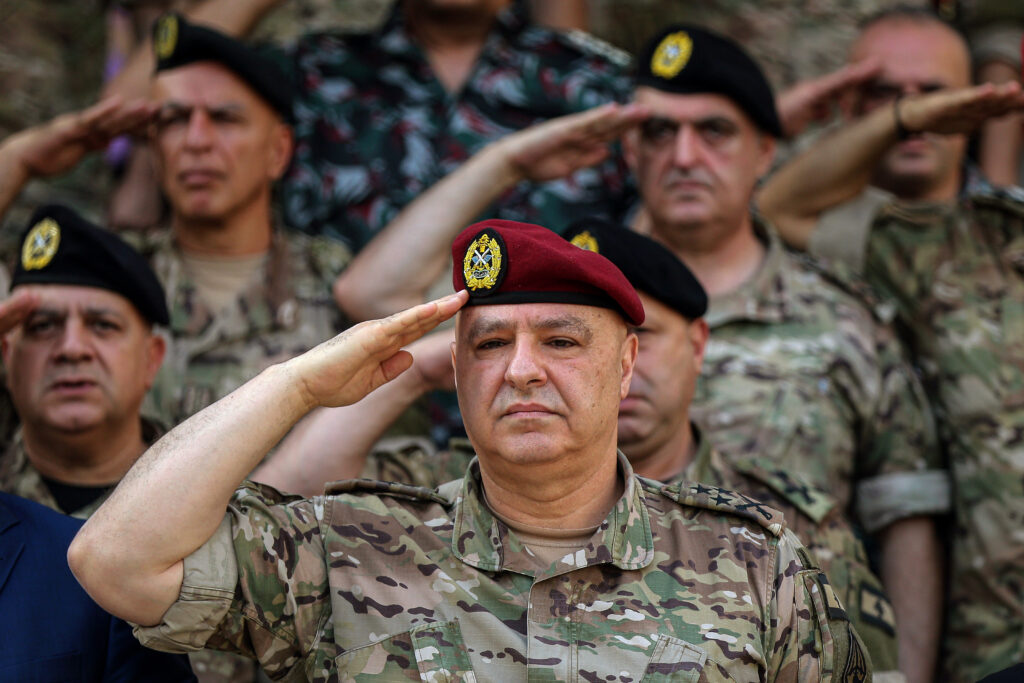Analyses / Middle East / North Africa
10 January 2025
Presidential Election in Lebanon: Dynamics and Internal and External Challenges

Lebanon enters 2025 amid a Middle East where power dynamics are evolving, yet the region remains trapped in a protracted economic crisis. Nevertheless, the country has demonstrated its determination to end the presidential vacuum—a significant obstacle to implementing essential reforms aimed at overcoming the crisis and navigating ongoing geopolitical shifts—by electing, on 9 January, the Commander-in-Chief of the Armed Forces, Joseph Aoun. Since the end of Michel Aoun’s presidential term on 30 October 2022, no consensus had been reached to elect a new president, leaving the country paralysed by political stagnation. This situation, however, is a recurring feature of Lebanese politics due to two structural factors: the functioning of the Republic and the regional rivalries in which it is entangled.
Institutionally, the Constitution mandates the presidential election through secret indirect suffrage by the 128 members of the Chamber of Deputies. However, the vote can only take place if two-thirds of the members are present in the chamber—a condition that makes the system highly vulnerable to obstruction.
Additionally, Lebanon’s political scene is deeply fragmented, particularly around Hezbollah, hindering the emergence of a consensus. It is further influenced by international actors who impose their political agendas on internal affairs. In this context, the “Quintet” (France, the United States, Egypt, Saudi Arabia, and Qatar) has been attempting to agree on a common candidate, leveraging their respective influences to sway the internal political landscape.
In light of this, what developments emerged from the parliamentary session of 9 January 2025 regarding the presidential election? What were the internal and external stakes associated with this pivotal event?
What events sparked this momentum in the presidential race after multiple failed attempts to hold an election since October 2022?
The first factor enabling the prospect of a presidential election was the ceasefire agreement with Israel reached on 27 November 2024. Despite reports of daily violations, this relative calm allowed for a renewed focus on domestic political priorities.
The choice of 9 January was also driven by the urgency to elect a new president before Donald Trump’s return to the White House on 20 January. In light of the potential instability of his foreign policy and the significant role of the United States within the “Quintet,” stakeholders prioritised holding the election under the Biden administration.
Lastly, the collapse of the Assad regime on 8 December 2024 weakened Iran’s influence in Lebanon, and consequently, that of Hezbollah. Walid Jumblatt, leader of the Progressive Socialist Party (PSP) from 1977 to 2023, recognised the magnitude of this shift and became the first Lebanese political figure to establish contact with the new regime in Syria. The meeting on 22 October 2024 served as an opportunity to lay the groundwork for new bilateral relations, emphasise the protection of minority rights under the governance of Hayat Tahrir al-Sham (HTS), and discuss the Lebanese presidential election.
Despite his declared intention not to interfere in Lebanon’s internal affairs, Ahmed al-Cherah, the appointed leader of post-Assad Syria, extended his support to Joseph Aoun, who ultimately secured the presidency.
What were the obstacles and dynamics surrounding Joseph Aoun’s candidacy?
This support is undeniably linked to Walid Jumblatt’s endorsement of the army chief on 18 December 2024, following a meeting with Nabih Berri, Speaker of the Chamber of Deputies. For the Druze leader, Joseph Aoun represented a guarantee of stability, given his role as head of the army and a track record that Jumblatt viewed as positive—reassuring both Lebanese citizens and foreign stakeholders.
Joseph Aoun’s candidacy was thus perceived as a third way, moving beyond the polarisation surrounding Hezbollah and offering a stabilising option for the Lebanese due to his military background. Historically, several military leaders have been elected as heads of state during periods of political deadlock, despite Article 49 of the Constitution, which stipulates that such officeholders cannot be elected during their term or within two years of its conclusion. With Joseph Aoun securing the necessary votes for election, the scenario of a constitutional amendment could once again unfold to enable his appointment as head of state.
As outlined by the “National Pact,” this position is reserved for the Maronite Christian community. However, the support for Joseph Aoun sparked significant reactions within this group. A broad consensus emerged around the perception that these manoeuvres were an attempt to deprive Maronites of the ability to choose their own candidate. The anticipation surrounding official endorsements from Christian party leaders highlighted the fragile balance leading up to the parliamentary session.
From Hezbollah and its allies’ perspective, Joseph Aoun’s candidacy was seen as an attempt by their opponents to translate their military defeats into a political loss. Weakened by numerous setbacks and failures against Israel, Hezbollah’s credibility has eroded. Additionally, the party can no longer rely on Iran’s previously robust support, as Tehran’s ability to impose its political agenda has diminished.
Despite this fragility, Hezbollah’s liaison unit head signalled firm opposition to Samir Geagea but did not rule out the army chief. This veto is rooted in the political stance of Geagea, leader of the Lebanese Forces, who is strongly opposed to Hezbollah and allegedly has, according to the “Party of God,” a “destructive agenda” for Lebanon.
The 27 January deadline, marking the end of the 60-day ceasefire with Israel, places Hezbollah in a precarious position. Its leadership faces a dilemma: either partially maintain the ceasefire and begin reconstruction in exchange for backing the candidate favoured by international actors, which would mean a loss of influence over domestic politics, or risk further isolation.
Given these dynamics, Joseph Aoun’s election was far from assured, as it lacked the endorsement of the Amal-Hezbollah Shia tandem. Furthermore, on the eve of the parliamentary session, not all official candidates had been clearly announced.
What are the geopolitical implications of the election of Lebanon’s President of the Republic?
The uncertainty surrounding the outcome of the 9 January 2025 election was heightened by the lack of a clear consensus within the “Quintet.” While Washington and Paris supported Joseph Aoun’s candidacy among their Lebanese interlocutors, other member countries remained more reserved in their positions.
Nonetheless, this presidential election provided Saudi Arabia with an opportunity to re-establish its presence in Lebanese political affairs after years of estrangement. The meeting between Yazib bin Farhan, Saudi advisor on Lebanese affairs, and Nabih Berri on 6 January 2025 clarified Riyadh’s stance, identifying Joseph Aoun as the candidate aligned with the Quintet’s expectations.
This development elevated the Speaker of the Chamber of Deputies to a position of significant influence, making him a central arbiter in Lebanese politics. As the leader of the Amal Movement and an ally of Hezbollah, Nabih Berri committed to securing the election of a president acceptable to the Quintet, with the hope of gaining concessions. Among these, he seeks contributions for rebuilding infrastructure destroyed during the Israel-Hezbollah conflict, contingent upon guarantees regarding the militia’s armament.
The session on 9 January 2025 commenced with the presence of all 128 deputies, but Joseph Aoun fell short of securing victory in the first round, garnering only 71 of the 86 required votes. This initial round revealed two key trends: the monopolisation of the political landscape by the army chief and the dominant influence of foreign powers in the process.
Beyond the 37 blank votes, some deputies expressed their dissent by writing “sovereignty and the Constitution” or the names of Saudi and American emissaries on their ballots. Opposed to the framing of Joseph Aoun as a consensus candidate, these deputies sought to highlight the influence of foreign powers on the presidency and raised questions about Lebanese sovereignty and the constitutional amendment required for his candidacy. The Quintet’s involvement was perceived by some as an attempt to impose a candidate prioritising international interests.
The second round, held on the same day, ultimately resulted in Joseph Aoun’s election with 99 votes. While optimism surrounds his victory, it should not overshadow the numerous challenges ahead, including the fragile preservation of relative peace with Israel and the implementation of essential domestic reforms.

